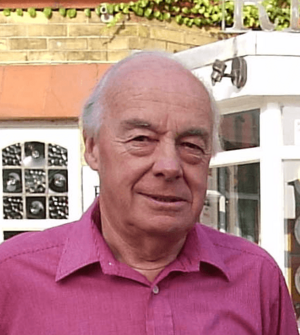Rodney Loudon facts for kids
Quick facts for kids
Professor Rodney Loudon
|
|
|---|---|

Rodney Loudon in 2004
|
|
| Born | 25 July 1934 Prestwich, Bury, Manchester
|
| Died | 25 December 2022 (aged 88) Hadleigh, Suffolk
|
| Alma mater |
|
| Awards |
|
| Scientific career | |
| Fields |
|
| Institutions |
|
| Thesis | The theory of the absorption edge in semiconductors |
| Doctoral advisor | Roger J. Elliott |
Professor Rodney Loudon (born July 25, 1934) was a British scientist who studied physics. He was famous for his work with light and tiny particles, a field called quantum optics. He used to be a professor at the University of Essex.
Contents
Learning and Early Career
Rodney Loudon went to Bury Grammar School in Manchester. He then studied at the University of Oxford. There, he earned two important degrees. These were his Master of Arts (1956) and Doctor of Philosophy (1959). He was a member of Brasenose College at Oxford. After finishing his studies, he did more research at the University of California, Berkeley.
Amazing Discoveries in Physics
Professor Loudon's research focused on how light behaves. He studied how light interacts with materials. This area of study is called solid state physics and laser physics. He was especially interested in light scattering. This is when light bounces off or goes through something.
One of his most important papers was in 1964. It was about the Raman effect. This effect explains how light changes when it hits a material. His paper was one of the most cited in physics during the 1960s.
He wrote over 190 scientific papers and three books. His book, The Quantum Theory of Light, is very well-known. It has been translated into Russian and Japanese.
What He Studied
Professor Loudon's early work looked at tiny particles. These include excitons, phonons, and magnons. He also studied how light behaves in unusual ways. This includes the statistical properties of light. Later, he researched how light interacts with surfaces. He also studied how light can be made stronger (amplification) or weaker (attenuation). His work also covered how light is detected.
Professor Loudon worked at the University of Essex for many years. He was a professor, chairman, and dean there. He also worked with big companies. These included British Telecom, Royal Radar Establishment, and Bell Telephone Laboratories. He helped these companies with both basic and applied research. He was also part of the Institute of Physics Council.
Books He Wrote
Professor Loudon wrote several important books:
- The Quantum Theory of Light (1973). This book had new editions in 1983 and 2000.
- Scattering of Light by Crystals (1978), which he wrote with William Hayes.
- An Introduction to the Properties of Condensed Matter (1989), written with David J. Barber.
Awards and Special Recognitions
Professor Loudon received many awards for his work:
- He became a Fellow of the Royal Society (FRS) in 1987. This is a very high honor for scientists in the UK.
- He won the Young Medal and Prize in 1987.
- He received the Max Born Award in 1992.
- He was given the Humboldt Prize in 1998.
 | Calvin Brent |
 | Walter T. Bailey |
 | Martha Cassell Thompson |
 | Alberta Jeannette Cassell |

